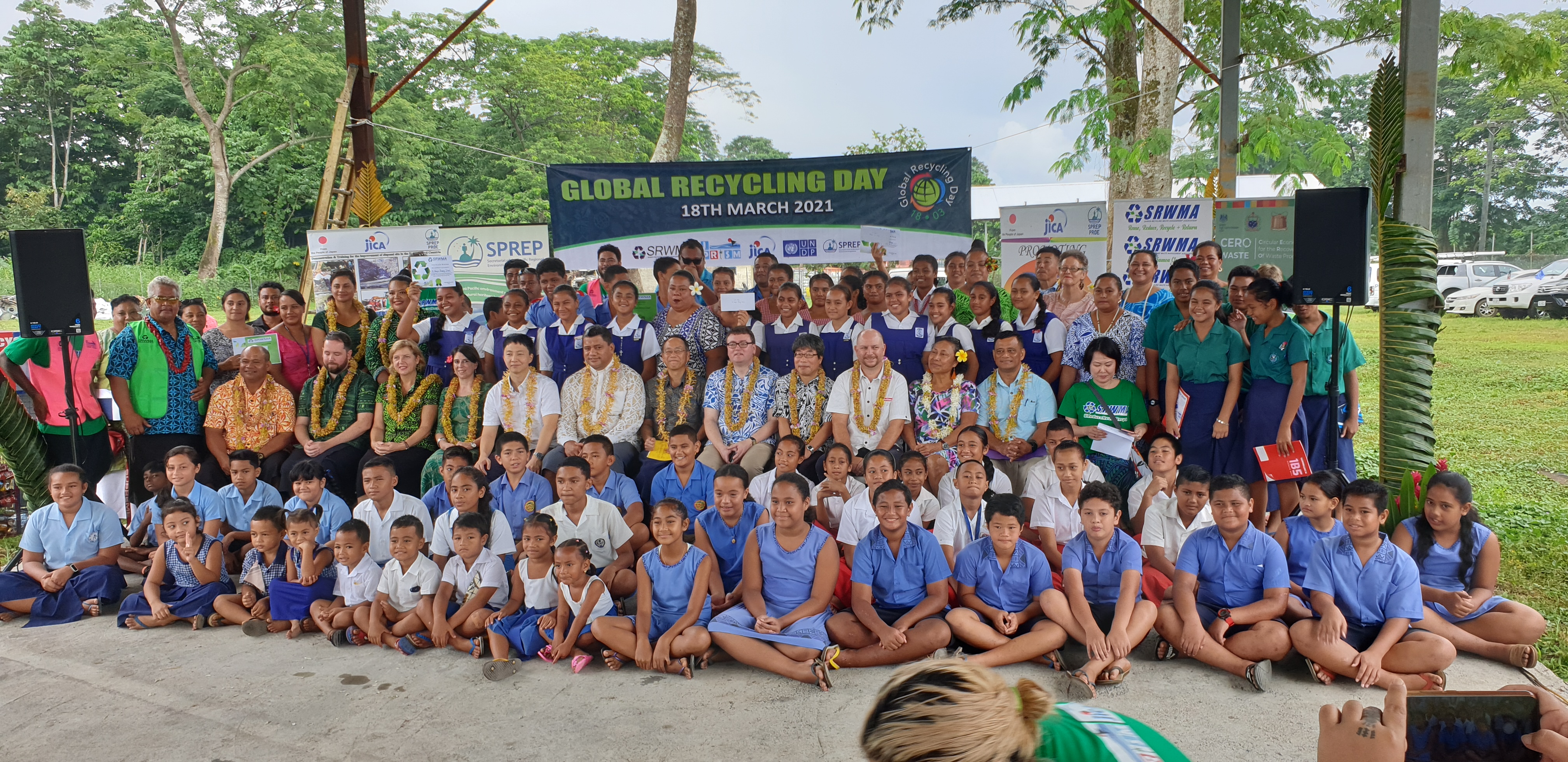Global Recycling Day event at the Samoa Recycling & Waste Management Association's HQ at the Tafaigata Landfill
--- Image caption ---
Apia, Samoa – As Samoa joined worldwide celebrations for the Global Recycling Day on March 18, it was also reminded to ‘recognize recycling as an essential industry’, as per this year’s theme.
Doing so will not only help protect our natural resources by using them more efficiently, but also creates a circular economy – a new way of creating value, and ultimately prosperity, through extending product lifespan and relocating waste from the end of the supply chain to the beginning.
Each year, recyclables save over 700 million tonnes in carbon dioxide emissions and this is projected to increase to 1 billion tons by 2030.
For small islands like Samoa, with a growing waste management problem, limited land for waste disposal, lack of expertise to recover waste and insufficient resources to manage generated waste in a sound manner, recycling activities are imperative for our very survival. Recycling services are vital for ecosystem health, public health through proper and timely waste disposal management, and equally critical for the health of our economy as an essential part of the supply chain.
It is why the work of organizations like the Samoa Recycling and Waste Management Association (SRWMA) is vital, working in close partnership with the Ministry of Natural Resources and Environment (MNRE) and supported by the United Nations Development Programme (UNDP), the British High Commission in Apia, the Embassy of Japan, the Japan International Cooperation Agency (JICA), the South Pacific Regional Environment Programme (SPREP) and other national and regional organizations that have sponsored SRWMA’s Global Recycling Day Campaign.
This included yesterday’s event at the Tafaigata Landfill, attended by students that participated in the ‘Reduce, Reuse and Recycle for a better Samoa’ competition for 14 schools.
Prime Minister and Patron of SRWMA, Tuilaepa Sailele Malielegaoi, focused his keynote address at the event on the students in attendance, highlighting the importance of being responsible citizens, recycling rubbish and in the process, saving the environment.
The schools’ competition attracted a lot of attention.
“We kicked off this event with our school’s recycling competition where the schools managed to collect 4,144 kgs of recyclables that could’ve ended up in the landfill or our oceans. With limited resources, we managed to collect 18 end-life vehicles with a total weight of 45,000 kgs. Apart from this, we collected 35,329 kgs of steel, electronics, refrigerators, ovens and microwaves. We also collected 115 kgs of plastic and 25 kgs of aluminium cans, bringing our total of recyclables to 84,469 kgs within 3 days,” said SRWMA President, Marina Keil. “It was a great success.”
In lieu of this year’s theme and in the context of COVID-19 socio-economic recovery, UNDP, together with MNRE, the Scientific Research Organisation of Samoa (SROS) and SRWMA, recently launched the ‘Circular Economy for the Recovery of Waste Programme’, known as the CERO Waste Programme, jointly funded by the British High Commission in Apia and UNDP.
The project targets the most problematic, low-value waste streams in Samoa, including glass, plastic and paper, to recover what traditionally is landfilled waste, into value-added products. The glass industry globally is one example of a coalition of manufacturers that relies on recycled content and is extending their reach thanks to local community recycling programmes and workers who are collecting and processing materials every day to supply them with recycled glass for food and beverage packaging.
“We are excited about our partnership with SRWMA to recover glass waste into aggregate, an alternative to natural sand, for the production of concrete blocks, pavement and headstones. UNDP is committed to realizing the potential of waste recycling and recovery industries that aid the transition towards a circular economy, contributing to efforts to create a cleaner and greener Samoa, whilst providing impact entrepreneurship and employment opportunities for youth and women,” said UNDP Deputy Resident Representative, Verena Linneweber.
COVID-19 has shown a tremendous capacity for people to come together as a global collective and make personal and societal changes in support of the global good. There is growing movement to harness that collective energy and use this opportunity to rebuild a more sustainable, resilient and just economy, with the recycling industry playing a big role in achieving these efforts.
The Global Recycling Day events will culminate in a community clean-up at the Apia Waterfront and the Vaimoso Riverside on Saturday, following recycling collection in different villages throughout the week.
Ambassador of Japan to Samoa, H.E. Genichi Terasawa, called on local leaders to take part in the clean-up.
“I will also participate in this activity with expectations that public awareness will be promoted furthermore if local leaders and adults participate,” said the Ambassador.
There will also be a Family Fun Day later on Saturday at the Malaefatu Park, Sogi which will be open to the public to sell what they no longer need. Vendors of recycled, reusable and upcycled products will also be showcasing their wares on the day.
-ENDS-
For media queries, please contact:
Laufaleaina Lesa, UNDP Multi Country Office, Samoa|Tel. +685 23670|E: laufaleaina.lesa@undp.org
www.ws.undp.org @UNDP in Samoa, Cook Islands, Tokelau & Niue @undpsamoa
*****
Marina Keil, SRWMA President, Samoa|Tel. +685 7524939|E: srwma18@gmail.com

 Locations
Locations
